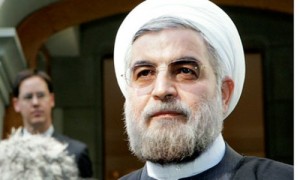 Rowhani's election has given hope to artists, students and intellectuals in the Islamic Republic, writes author and playwright Nima Dinti. However, he admits warming ties with Israel is still a long way off.
Rowhani's election has given hope to artists, students and intellectuals in the Islamic Republic, writes author and playwright Nima Dinti. However, he admits warming ties with Israel is still a long way off.
TEHRAN - I am a writer. Writers in Iran generally oppose our government’s policies. Writers in Iran are usually identified as “intellectuals” who seek liberty and freedom of thought and expression.
It is natural that when I, as an Iranian, am asked to write about another country, I would voice a hope for friendship, peace and an improvement in relations. It is natural that when asked to assess the significance of the election of Hasan Rowhani as president and its impact on Iran’s relations with another country - whatever it may be - I will obviously first of all hope for peace and good relations. And yet two issues should be considered: First of all, who is Rowhani, and secondly, what are the countries in question?
More than anything, people’s minds in Iran and elsewhere should be put to rest (or perhaps quite the opposite, disturbed): Rowhani is not meant to be an opposition leader. He is not even supposed to lead the reformists. Rowhani is not the savior. Rowhani is simply trying to calm things down. Thus, no one should expect that upon Rowhani assuming office Iran will become a sister state to Israel and to the United States. After all, we are dealing with deeply-rooted political thinking, whether correct or not, that has taken hold in the minds of Iranian politicians a long time ago.
I don’t know much about Israel, other than a few nice music albums, apples from Israel and Palestinianchildren.
I’m a writer, but I must confess that I don’t know many historic details. In Iran, this is considered a great weakness for a writer. Then again, my life is made easier by this fact: I don’t have to consider divine promises, Jerusalem and Palestine. I’m not even concerned with street battles between Israeli soldiers and stone-wielding youth. What my eyes do see are children who are continuously being killed.
Therefore, let me write now not as a writer, but as an observer, as a person who once in a while turns on his TV and once in a while watches the news. I have doubts regarding Israel’s just cause, the same doubt that is expressed more extremely by many Iranian politicians. I don’t want to upset anyone’s hopes, but even if there are changes in the government and its policies here, I have great doubts whether compromising their natural rights in exchange for an improvement in relations with Israel will appeal to many Iranians. Undoubtedly such an improvement would alleviate many of the problems caused by sanctions on Iran, but I believe that the chances for establishing relations with the United States are much better than with Israel.
A new wave of hope has been launched in Iran. Rowhani is not the ideal president for us. When I say us, I refer to the artists, writers, intellectuals and students, as well as the educated and rational sectors of society. But he is a man who talks of hope and is trying to patch up the rifts between different sectors. I don’t know if and to what extent he will succeed, but our hopes are rising daily.
It's important to note that if there is a dispute between Iran and Israel, the best solution would be to settle it through dialogue, as was proposed by [former] President [Mohammed] Khatami 12 years ago, but which was rejected out of hand by the enlightened world. I believe that threats of boycott and warmongering are inhumane.
As a young Iranian writer, I am eager to establish relations between Iran and Israel. I am eager for talk. I am eager for peace. I am eager to avoid war. If we are destined not to be friends, it’s alright if we’re not enemies. I’m not concerned with what should or shouldn’t be done. That’s for politicians to decide. As a poet and a writer I would prefer to see all borders dissolved, but I am silenced by politicians who tell me this is impossible. Speaking is forbidden! So I have no choice but to remain silent and to cling to hope, as we have had to for years and continue to do.
Maybe we can imagine a day when issues of land and borders do not play into the hands of politicians. I believe that collaboration between artists in both countries is essential for attaining that vision. After all, if politicians were supposed to solve the world’s problems they have had all of history to do so.
Maybe it’s time to slowly change the system so that humanity can imagine better days. Maybe these days will arrive during Rowhani’s tenure. Maybe years later. We have no choice but to give hope a virtual color, because otherwise it is black.
By Haaretz
The Iran Project is not responsible for the content of quoted articles.

 QR code
QR code